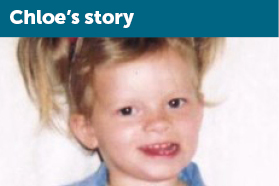Chloe’s story
Kate and Chris know only too well how important it is to get independent advice and support when something goes badly wrong.
When two year old Chloe fell ill, they rushed her to their local A&E at a major London teaching hospital but were sent home. As Chloe’s condition worsened they returned to A&E but still faced long delays in getting treatment.
The hospital staff had failed to recognize meningitis and by the time Chloe finally got the vital diagnosis it was too late. Chloe died on 28 September, aged just two years and nine months.
Desperate to find out what had gone wrong, and to make sure it didn’t happen to another family, Kate and Chris turned to AvMA. They spoke to one of our specialist medical-legal experts who offered them sympathy and support whilst setting out their rights and the action they could take.
The NHS Trust carried out an internal investigation which identified many areas where care should have been better and set out a range of recommendations for improving care of children in A&E in the future. However, Kate and Chris were excluded from the investigation and they were deeply upset to find that their version of events had been simply dismissed in favour of accounts from staff.
Most hurtful of all, despite a catalogue of errors and delays contributing to Chloe’s death, the Trust never once apologised to her parents for its failings.
With AvMA’s support, Kate and Chris called for an independent investigation but this was rejected. They were determined that the Trust should acknowledge the extent of its failings so, with further support and advice from AvMA, they reluctantly decided to take legal action. Although they had never been seeking compensation, they wanted to ensure that no other family would lose a child in such terrible circumstances.
AvMA referred Kate and Chris to one of the accredited specialist solicitors on its clinical negligence panel – Elizabeth Batten of Parlett Kent. She submitted a claim on their behalf, but stressed that compensation was not their main objective and suggested a meeting. Kate and Chris hoped that at a meeting the Trust would admit the seriousness of its failings and offer an apology.
The Trust’s solicitors admitted liability and made a Part 36 offer – an offer of money to settle a claim. But there was still no offer of a meeting, no acknowledgement of the family’s suffering and no apology for Chloe’s avoidable death.
Kate and Chris were given just 21 days to accept the offer. But money had never been the reason for their action so they kept on battling for an apology.
Eventually, after nearly three years of denials, the Trust finally agreed to meet the family. However, they insisted that the legal claim must be settled first so Kate and Chris reluctantly accepted the offer.
The meeting finally took place and Kate and Chris gave a heart-rending account of their experience and explained how the Trust’s treatment of them had added to the crushing loss of their daughter. At last Kate and Chris received an apology for Chloe’s death and a feeling that, just maybe, the trust appreciated the gravity of its failings and would put them right. This was all they had ever wanted.
Comment
Sadly, AvMA comes across similar attitudes in other NHS trusts. The Trust made the all too common mistake of failing to involve the family in the investigation and dismissing their version of events in favour of statements made by staff. If it had agreed to an independent investigation and obtained the opinions of independent medical experts, its response might have been radically different.
No other organisation is available to provide the kind of advice and support that AvMA did. AvMA’s accredited specialists are chosen both for their expertise in clinical negligence and for their ability to provide clients with a caring, sensitive and efficient service.
Kate and Chris feel that even with their considerable determination, they would have got nowhere without AvMA’s expert support.

